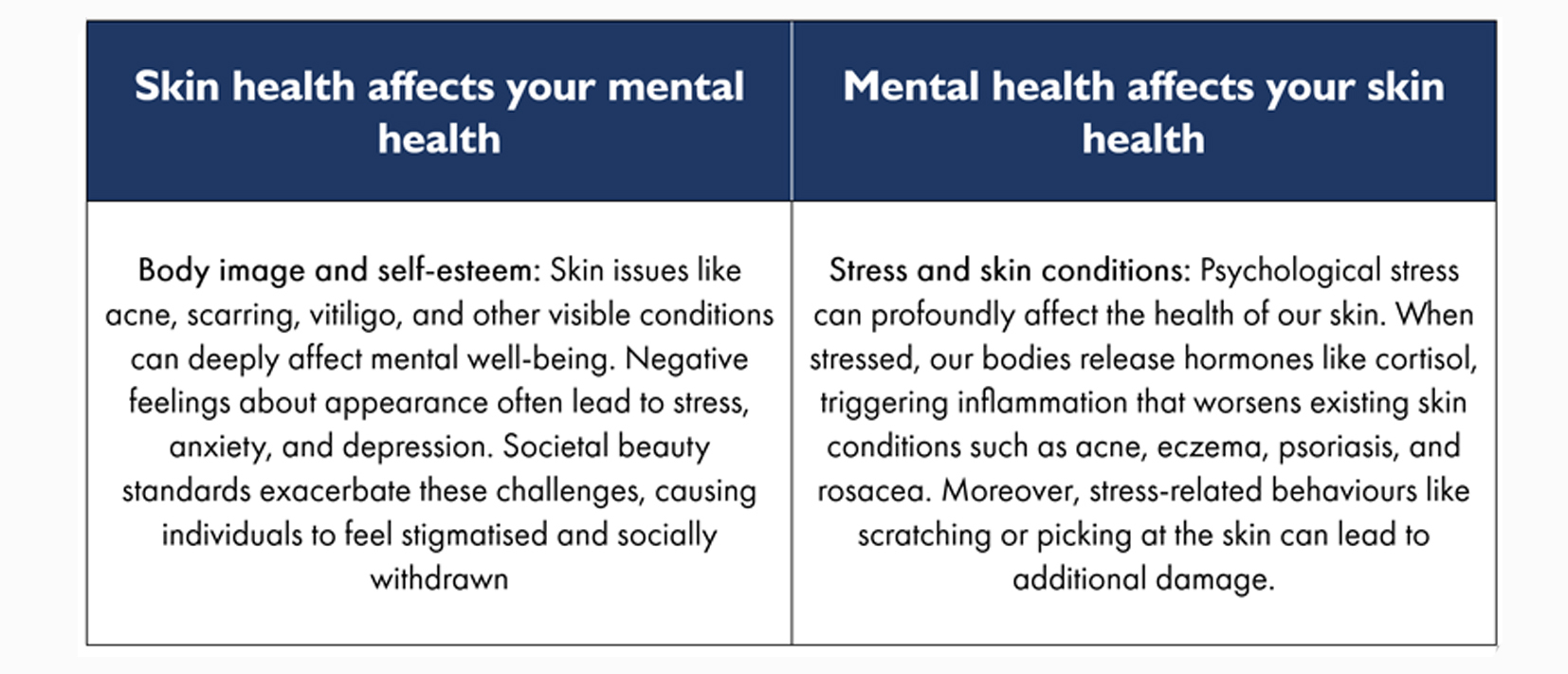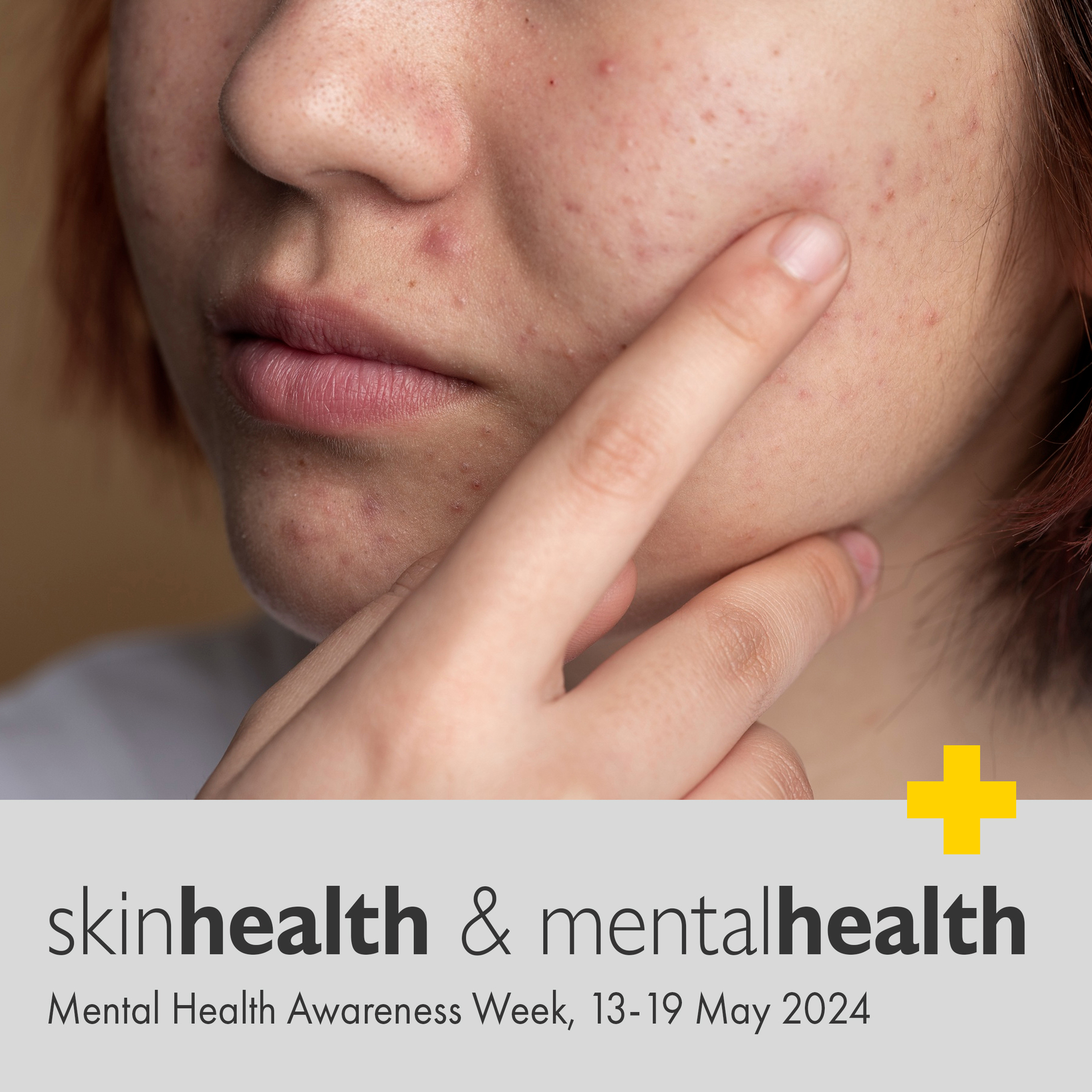


With this week (13-19 May 2024) being Mental Health Awareness Week we thought we would pull together some information on how different skin conditions can have an effect on peoples’ mental health.
An All Party Parliamentary Group on Skin (APPGS) survey of people with skin conditions found:
98% of patients with a skin disorder report that their condition affects their emotional and psychological wellbeing, yet only 18% have received some form of psychological support
- 93% of people with skin disease reported a negative impact on their self-esteem
- 87% of people with skin disease reported a negative impact on their social life or leisure and sporting activity
- 83% of people with skin disease reported a negative impact on their sleep
- 73% of people with skin disease reported a negative impact on intimate relationships
- 69% of people with skin disease reported a negative impact on their work or education
- 5% of people with skin disease reported having suicidal thoughts
It is clear that there is a direct link between skin conditions and mental health and it goes both ways. Living with a skin condition can directly affect mental well-being and mental health struggles can adversely impact skin health. Recognising and addressing this bidirectional link is crucial for holistic health and well-being. For example:

Eczema
The intense itching and discomfort of eczema can profoundly affect quality of life, leading to feelings of irritability, frustration and disrupted sleep. The chronic nature of eczema further exacerbates stress and psychological distress, highlighting the need for comprehensive support and management strategies. More than 30% of people with atopic dermatitis have also been diagnosed with depression or anxiety, according to the National Eczema Association.
Acne
Acne frequently correlates with psychological challenges, such as anxiety, depression, and diminished self-esteem. The conspicuous appearance of acne lesions often triggers self-consciousness, prompting individuals to withdraw socially and fostering negative body image perceptions.
Psoriasis
Psoriasis carries an elevated risk of depression, anxiety, and diminished quality of life. The visibility of psoriasis lesions, the persistent nature of the condition, and the possibility of experiencing pain and discomfort collectively contribute to its psychological repercussions.
Rosacea
The enduring facial redness and possible alterations in appearance associated with rosacea can induce feelings of self-consciousness, embarrassment, and a negative self-perception. These factors may contribute to heightened anxiety, depression, and a reduced quality of life.
How to Help your Skin and Mental Health
There are a number of lifestyle changes you can make to help improve your mental health, which may make it easier to live with a skin condition:
Sleep
Experiencing itchy skin can impede your ability to achieve a restful night's sleep, potentially exacerbating symptoms of anxiety or depression. To facilitate easier sleep onset, consider sleeping in natural fibres for both pyjamas and bedding, avoiding caffeine in the afternoon, refraining from napping during the day, , and maintaining a cool sleeping environment.
Find support
Finding support groups can be invaluable for individuals navigating skin conditions. Connecting with like-minded individuals who understand the challenges firsthand can provide a sense of belonging, validation, and emotional support. Support groups offer a platform to share experiences, exchange coping strategies, and access helpful resources. Whether in-person or online, these communities can empower individuals to better manage their condition and improve their overall well-being.
Stay active
Regular exercise can boost your mood by releasing endorphins, but it's essential to strike a balance. Dehydration from exercise can dry out your skin, and sweat may cause stinging and irritation. To mitigate these effects, prioritise hydration, opt for loose-fitting clothing during workouts, and avoid hot showers post-exercise.
Practice mindfulness
Mindfulness practices have shown to alleviate anxiety and reduce itching associated with atopic dermatitis. Both atopic dermatitis and chronic itch activate brain regions linked to chronic stress and pain, leading to the release of stress hormones and inflammatory chemicals. However, research suggests that meditation can deactivate these brain regions, potentially alleviating itching and lowering inflammatory and stress hormone levels.
#MentalHealthAwarenessWeek
Let's unite this #MentalHealthAwarenessWeek and offer each other unwavering support through life's highs and lows. Together, we can foster understanding, compassion, and resilience, empowering everyone to prioritise mental well-being.




.jpg)